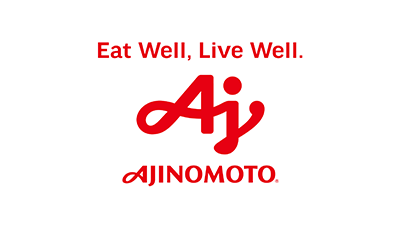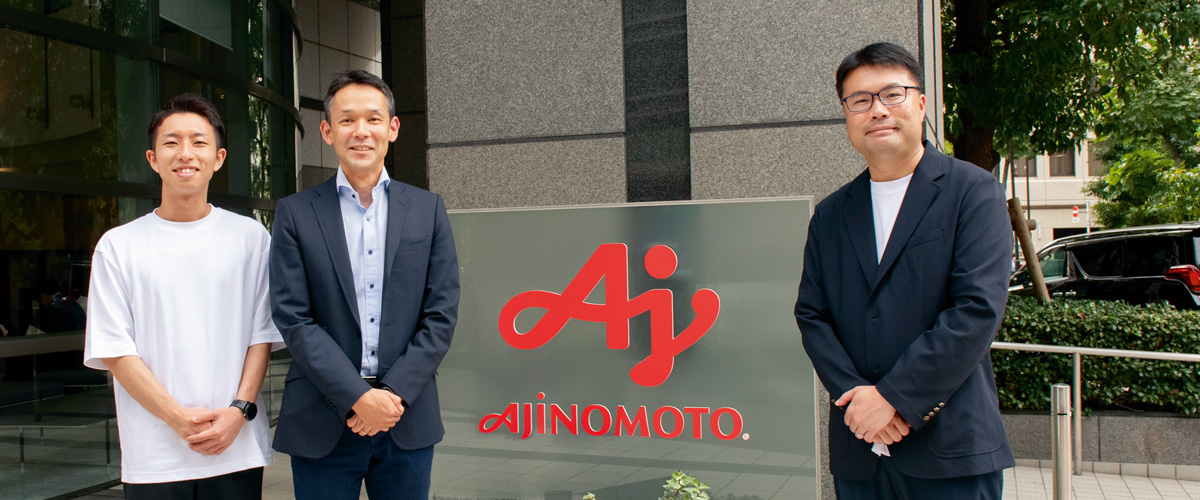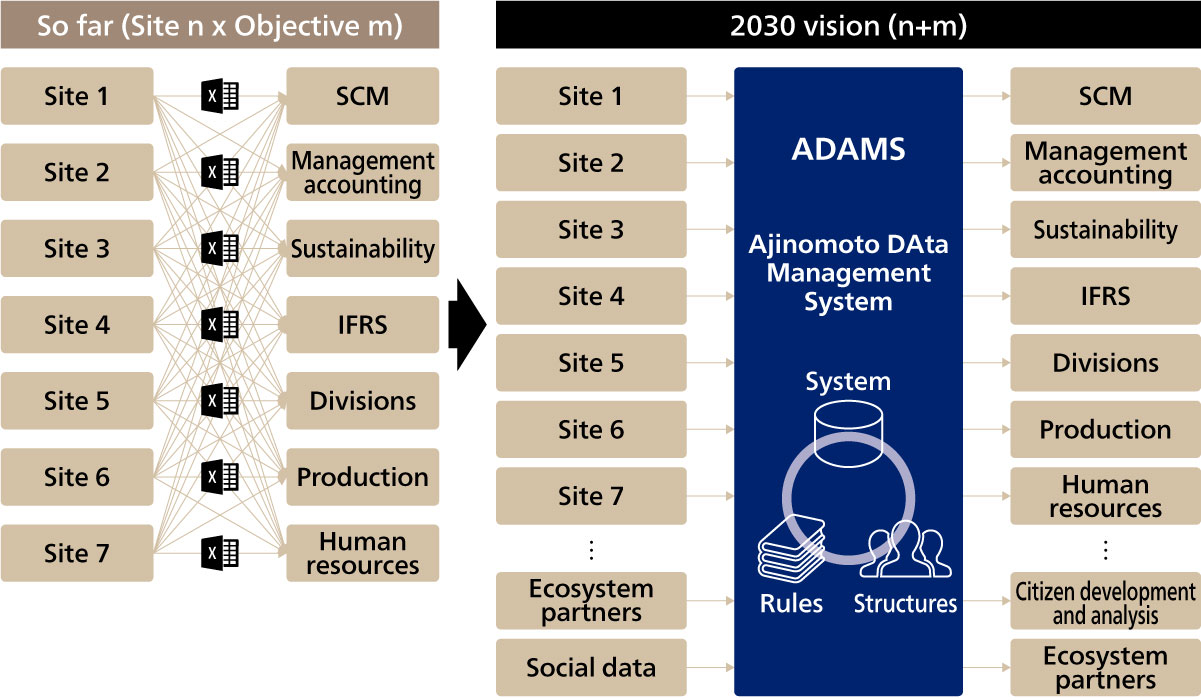Ajinomoto Co., Inc. established the Digital Transformation Department in 2019 to consolidate previously localized activities and launch the full-scale, Group-wide, global roll-out of initiatives to achieve corporate transformation that leverages digital technologies. However, the siloing of systems and data was a significant challenge. To address this issue, Ajinomoto partnered with ABeam Consulting in 2021 to initiate comprehensive Group-wide data management. ABeam provided end-to-end support, from developing a master plan to enabling in-house implementation. By focusing on use-case-driven data integration, Ajinomoto aims to create business value at an early stage and is actively promoting cross-functional data utilization as a key component of its business transformation.
Integrating data through a use-case-driven approach Fostering data utilization across the Group to accelerate business value creation
- Food
- DX
- Data-Driven Management


Challenge
- “Speed up × Scale up” to advance ASV (Ajinomoto Group Creating Shared Value) management
- Enhancing data-driven management
- Establishment of data infrastructure to share and pass on the Ajinomoto Group’s intangible assets as data assets across the Group
ABeam Solution
- Realization of use-case-driven Group-wide data management
Success Factors
- Integration of data valuable for operations transcending businesses and organizations. Promoting data utilization across the Group
- Documentation of the master plan for advancing Group-wide data management. Shared with stakeholders to foster common understanding and ensure the initiative’s adoption
Project Background
Creating new business value across businesses, countries and regions
Ajinomoto Co., Inc., a global enterprise established in 1909, manufactures and sells seasonings and foods, frozen foods, healthcare products, and more. The company’s purpose is to “contribute to the well-being of all human beings, our society and our planet with ‘AminoScience.’” Ajinomoto’s 2030 vision aims to extend the healthy life expectancy of 1 billion people and reduce its environmental impact by 50%, while achieving business growth. To realize this goal, Ajinomoto is driving business transformation for sustainable growth, including through efforts to transform existing operations and develop new businesses by pursuing digital transformation (DX) initiatives.
“The Ajinomoto Group operates with a business model in which its subsidiaries in various countries and regions maintain a high degree of independence while offering locally rooted products. While this independence is a major strength, it also presented a challenge: weak horizontal linkages between businesses and subsidiaries,” says Mr. Kazuaki Yasuma, Associate General Manager of the Planning & Innovation Group, Digital Transformation Department, Corporate Division, Ajinomoto.

“Going forward, we envision global deployment of ADAMS and the expanded use of generative AI. We have high expectation of ABeam as our partner for co-creating value.”
Mr. Kazuaki Yasuma
Associate General Manager
Planning & Innovation Group
Digital Transformation Department
Corporate Division
Ajinomoto Co., Inc.
Why ABeam
ABeam’s detailed proposal, backed by a deep understanding of Ajinomoto’s business characteristics, and a proven track record, was highly evaluated.
To address this challenge, Ajinomoto launched a project to develop the Ajinomoto Data Management System (ADAMS), infrastructure for data management across the Group. After evaluating half a dozen consulting firms, Ajinomoto selected ABeam Consulting as its partner to drive the project forward.
“ADAMS is a comprehensive system that encompasses not only systems but also rules and organizational structures. While many partners tend to specialize in one or the other, ABeam’s proposal offered an excellent balance between the two and was tailored to the unique characteristics of our business. The key differentiator was that we were able to envision a one-team approach to developing ADAMS based on use cases, taking into account specific data utilization scenarios,” says Mr. Yasuma.
Additionally, ABeam’s previous experience in supporting Ajinomoto’s affiliated companies further contributed to the decision to select ABeam as the partner.
Project goals, challenges, and solutions
A use-case-driven approach to align data with the needs of business units
This project aimed to integrate data valuable for operations and to empower individual employees to leverage the data for DX initiatives. The target scope was broad, encompassing domestic and overseas supply chain management (SCM), customers, R&D, management accounting, and collaboration with external parties. The project initially focused on domestic SCM, where the business units’ needs were clearly defined. The five pillars of the initiatives were “strategy,” “data management infrastructure construction,” “utilization support,” “rule formulation,” and “human resources education.” The plan was to proceed while ensuring balance across these areas. Furthermore, a use-case-driven approach was adopted, selecting use cases expected to be useful for business units and highly effective, and integrating the necessary data to realize them.
“To make the data truly useful for operations, it was essential to accurately identify the needs of the business units and ensure the integration of data that would genuinely benefit operations, while having the business units actively use the data,” says Mr. Toru Kumamoto, Manager of the Planning & Innovation Group, Digital Transformation Department, Corporate Division, Ajinomoto.
“By adopting a use-case-driven approach, we were able to construct a framework for data utilization that connects businesses while accurately understanding core issues, needs, and aspirations through dialogue with the business units. In particular, by strengthening data linkage across businesses and addressing challenges from a cross-sectional perspective, we were able to break down silos and enable Group-wide use of previously isolated data. As a result, we were able to maximize the project’s quality, cost, and delivery (QCD), which we regard as one of the key strengths of this use-case-driven approach,” says Mr. Kumamoto.

“ABeam’s integrity and excellent teamwork are truly impressive. I believe their ability to fully understand our goals and deliver high performance in the face of project challenges is a unique strength of ABeam.”
Mr. Toru Kumamoto
Manager
Planning & Innovation Group
Digital Transformation Department
Corporate Division
Ajinomoto Co., Inc.
ABeam’s contribution
Providing systematized organizational knowledge and leading the promotion of the project
Ajinomoto, its affiliate NRI System Techno, Ltd., and ABeam established a three-company co-creation system to drive the project forward. ABeam provided comprehensive support, ranging from formulation of the master plan during the project’s initiation phase, selection of use cases, construction of the data management infrastructure, integrated data design and development, and creation of the data catalog, to in-house production.
“ABeam understood the unique characteristics and strengths of each company and effectively led the co-creation system, which were key factors in the project’s success. I also believe that ABeam’s leadership, which provided timely and appropriate guidance and support, while maintaining a comprehensive view of the project and strengthening coordination with all stakeholders, played a crucial role,” says Mr. Kumamoto.
“One of my concerns at the start of the project was how to create value for ADAMS as early as possible, and how to ensure that the results were understood by all stakeholders. I appreciate ABeam’s support, which went beyond simply promoting the project. Through discussions, they provided us with new perspectives and helped turn our vague ideas into concrete plans,” says Mr. Yasuma.
“The organizational knowledge that ABeam has systematized has been very helpful to us. Thanks to ABeam’s wealth of accumulated know-how, the project progressed smoothly,” recalls Mr. Yuta Onozuka of the Planning & Innovation Group, Digital Transformation Department, Corporate Division, Ajinomoto.

“I really appreciated how ABeam staff expressed their opinions on equal terms, transcending company boundaries. We have strong confidence in ABeam’s organizational knowledge and look forward to their continued support to ensure the project’s sustainability.”
Mr. Yuta Onozuka
Planning & Innovation Group
Digital Transformation Department
Corporate Division
Ajinomoto Co., Inc.
ADAMS vision for data utilization across the Group

Results and future prospects
Business transformation through utilization of data management infrastructure
As a result of this project, ADAMS data maintenance and data integration into 15 different use cases within domestic SCM were achieved. These efforts have not only produced individual benefits but have also contributed to the realization of a rolling forecast, helping to maximize profits across business units. In addition, data that were previously locally optimized in silos by each business unit have now been integrated into ADAMS, driving business transformation.
“There is a use case that I developed with my co-workers to streamline sales operations. Traditionally, sales representatives used Excel to make sales forecasts for the next month based on POS data. This was burdensome because of the huge number of products. However, as a result of the integration into ADAMS, the sales team’s workload has been reduced, allowing them to use the freed-up time for more valuable activities, such as generating new ideas. They are grateful for this change,” says Mr. Onozuka, reflecting on the project’s success.
Furthermore, cross-sectional initiatives utilizing ADAMS have begun to take shape from the ground up. Employees at the Kyushu Plant, after learning about ADAMS, began using it in the belief that production planning could be made more efficient through data linkage with other plants.
“The number of new ideas we receive daily from employees who use ADAMS is steadily increasing. Recently, we have received numerous inquiries from within the company and from Group companies. We are seeing that ADAMS initiatives are expanding beyond our initial expectations. It is very gratifying to see that our initiatives to date are steadily creating value at workplaces and starting to have an impact on more departments and teams,” says Mr. Kumamoto.
The use of ADAMS at Ajinomoto is accelerating. Recently, the company developed a chatbot utilizing generative AI to help employees unfamiliar with data utilization, promoting the adoption of data-driven practices. Starting with the domestic SCM initiative, Ajinomoto plans to expand the scope to include customers, R&D, collaboration with external parties, and global data management, aiming for further business transformation through data utilization across the Group.
Customer Profile
- Company name
- Ajinomoto Co., Inc.
- HQ Location
- 15-1, Kyobashi 1-chome, Chuo-ku, Tokyo
- Founded
- 1909
- Estd.
- 1925
- Business
- Manufacturing and sale of seasonings and foods; frozen foods; and healthcare and others
- Paid-in capital
- 79,863 million yen (as of March 31, 2024)

Feb 18, 2025
- Corporate data and titles are those in use at the time of writing.
Click here for inquiries and consultations
